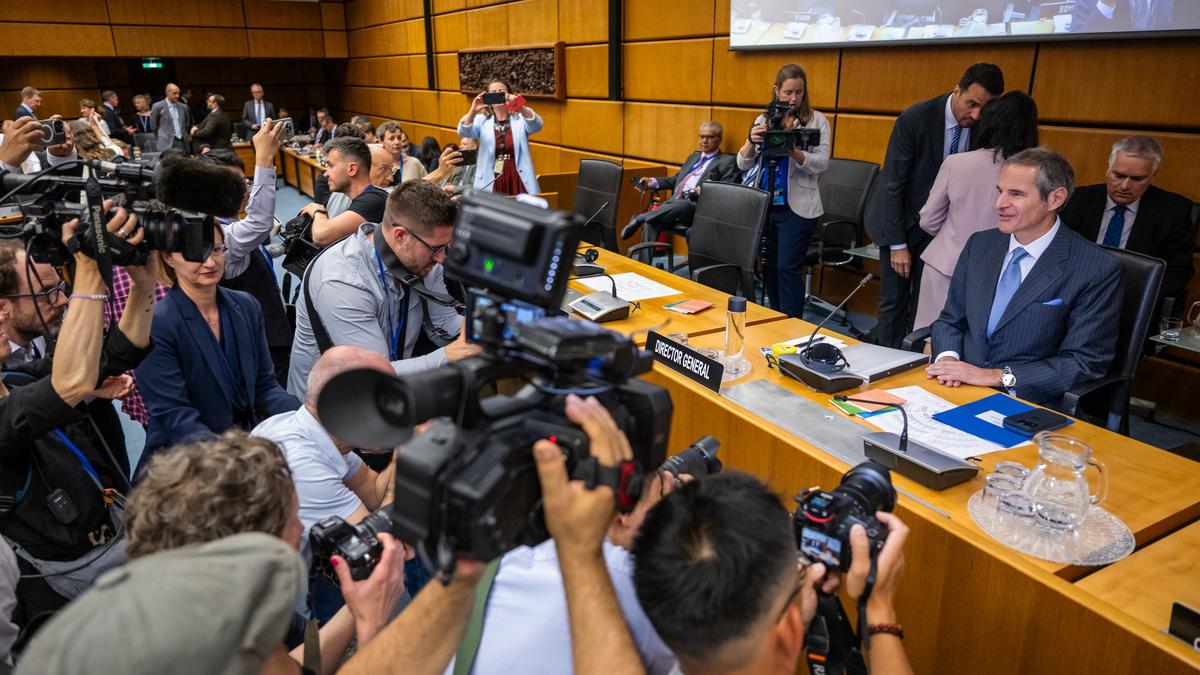IAEA chief Rafael Grossi arrives for a meeting of the IAEA Board of Governors at the IAEA headquarters on June 23, 2025, in Vienna, Austria.
| Photo Credit: Getty Images
The Iranian parliament started discussing a Bill that would pave the way for suspending Tehran’s cooperation with the International Atomic Energy Agency (IAEA), Mohammad Baqer Qalibaf, Speaker of the Islamic Consultative Assembly (Majlis), announced on Monday (June 23, 2025).
The announcement was welcomed by the members of the Majlis even as the IAEA convened an emergency meeting of its Board of Governors in Vienna where Director General Rafael Mariano Grossi said the global nuclear watchdog is ready to bring this military conflict “to an end”.
Israel-Iran conflict LIVE Updates on June 23, 2025
“We in the Islamic Consultative Assembly are seeking to approve a bill that would suspend Iran’s cooperation with the IAEA until we have objective guarantees of the professional behaviour (of the agency). In accordance with the religious decree of the Supreme Leader, Iran has no plans for non-peaceful activities. However, the world clearly saw that the Atomic Energy Agency has not fulfilled any of its obligations and has become a political tool,” said Speaker Qalibaf.
The announcement came on the day when the IAEA convened an emergency meeting of its Board of Governors in Vienna to discuss Sunday’s (June 22, 2025) U.S. attack on the nuclear sites in Fordow, Natanz and Isfahan that prompted Iran to criticise the IAEA and credentials of the western powers who had engaged Iran in negotiations over its nuclear energy plans.
Iran started pointing out the perceived failures of the IAEA soon after the Arak Heavy Water Reactor was attacked by Israel on June 19. Israel said the attack on the unfinished nuclear plant was carried out to prevent “nuclear weapons development”. IAEA issued a statement after the attack saying that the bombing on the facility did not lead to leakage of radioactive material.
Foreign Minister of Iran Seyed Abbas Araghchi demanded stern diplomatic action and enforcement of the U.N. Security Council’s Resolution 487 that was adopted unanimously on 19 June 1981, in response to Israel’s attack on the Osirak nuclear reactor of Iraq on 7 June 1981.
“The language of that resolution is unambiguous: any military attack on nuclear facilities is an assault on the entire IAEA safeguards regime and ultimately the NPT,” said Mr Araghchi.
Meanwhile, the U.S. attack on Iran’s nuclear facilities drew criticism from Mohamed ElBaradei, the former Director General of the IAEA, who authored a report titled “Implementation of the NPT Safeguards Agreement and Relevant Provisions of Security Council Resolutions in the Islamic Republic of Iran” in 2010. That report had suggested that there was “no evidence” that Iran was trying to develop a nuclear weapon. In a detailed statement issued over the weekend, Mr. ElBaradei described the Israel-U.S. campaign against Iran as reminiscent of the 2003 “catastrophic war on Iraq” and said, the war “is taking place against the backdrop of a total paralysis of the Security Council and obscene double standards by those who trumpet a rule based system.”
In his remarks at the IAEA’s Board of Governors Meeting in Vienna, Mr. Grossi cautioned against “nuclear accident” and said, “We are in the midst of a serious conflict. But there is still a path for diplomacy. We must take it, or the global non-proliferation regime could crumble and fall.”
“There is a common denominator: we do not want to see a nuclear accident; we do not want to see more nuclear weapon states in the world. The IAEA is ready to play its part to bring this military confrontation to an end,” Mr. Grossi said.
Published – June 23, 2025 10:43 pm IST
